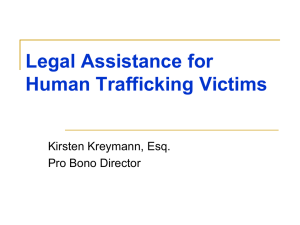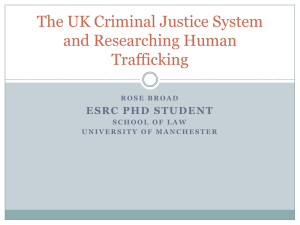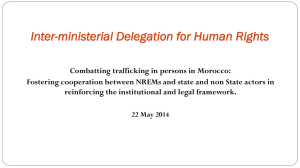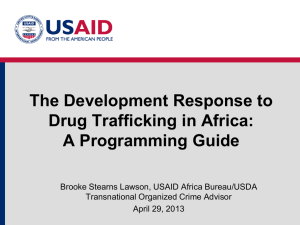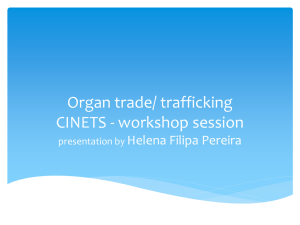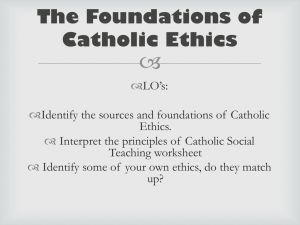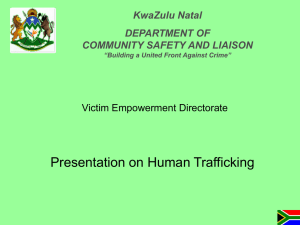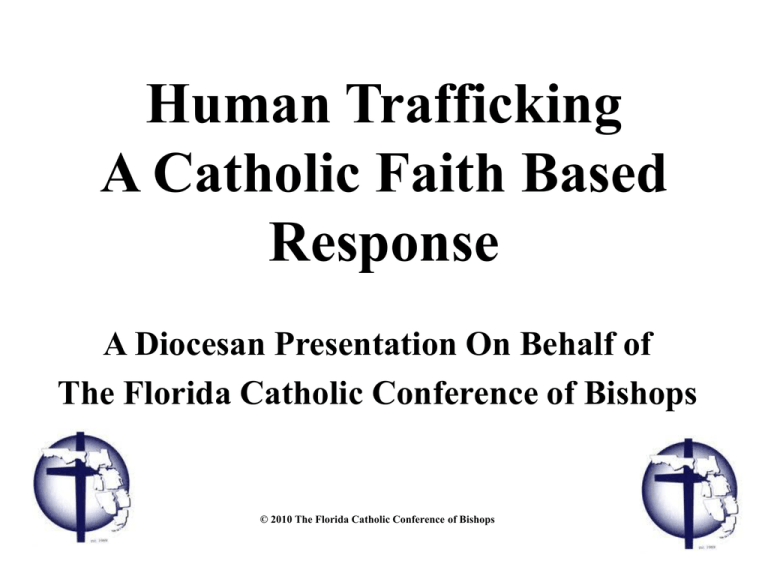
Human Trafficking
A Catholic Faith Based
Response
A Diocesan Presentation On Behalf of
The Florida Catholic Conference of Bishops
© 2010 The Florida Catholic Conference of Bishops
A Parish
Educational Presentation
Approved By The Florida Catholic Conference of Bishops
Developed By
Terry Coonan, J.D., M.Div.
Florida State University
Center for the Advancement of Human Rights
and
Thomas Gillan, CLET
Certified Human Trafficking Awareness Trainer
The Catholic Diocese of Orlando
2010 © The Florida Catholic Conference of Bishops
Introduction
What Is Human Trafficking?
• A form of modern-day slavery
• Involves the exploitation of persons for
commercial sex or forced labor, plus the inability
to extricate oneself from that situation
• Often involves crossing an international border
but does not require moving a victim
• Traffickers use force, fraud, or coercion to control
their victims
• Cases can be prosecuted on a variety of grounds
© 2010 The Florida Catholic Conference of Bishops
Is it really happening in Florida?
Yes!
• Human trafficking has become pervasive in Florida in the
past decade:
• Sex trafficking of immigrants and U.S. citizens
• Forced labor in Florida’s fields, restaurants & resorts
• Domestic minor sex trafficking of teenage runaways
• House slavery (“domestic servitude”)
The Challenge to the Catholic Community
• “The Lord has anointed me to bring good news
to the afflicted; he has sent me to bind up the
brokenhearted, to proclaim liberty to captives
and freedom to prisoners” (Isaiah 61:1)
• The only Old Testament command repeated
more frequently than that of caring for the
stranger is that of worshipping the one God
Catholic Social Teaching on
Human Trafficking
•
•
•
•
•
Catechism of the Catholic Church
Pope John Paul II
Pope Benedict XVI
Vatican Council II
U.S. Conference of Catholic Bishops
© 2010 The Florida Catholic Conference of Bishops
Catechism of the Catholic Church
The seventh commandment forbids acts or
enterprises that for any reason lead to the
enslavement of human beings, to their being
bought, sold and exchanged like merchandise,
in disregard for their personal dignity. It is a
sin against the dignity of persons and their
fundamental rights to reduce them by violence
to their productive value or to a source of
profit.
- Paragraph no. 2414
© 2010 The Florida Catholic Conference of Bishops
Pope John Paul II
The trade in human persons constitutes a
shocking offense against human dignity and a
grave violation of fundamental human
rights…Such situations are an affront to
fundamental values which are shared by all
cultures and peoples, values rooted in the very
nature of the human person.
continued…
© 2010 The Florida Catholic Conference of Bishops
Pope John Paul II
The alarming increase in the trade in human
beings is one of the pressing political, social
and economic problems associated with the
process of globalization; it presents a serious
threat to the security of individual nations and
a question of international justice which cannot
be deferred.
- Letter on the Occasion of the “Twenty-First Century Slavery – The Human
Rights Dimension to Trafficking in Human Beings” Conference 2002
© 2010 The Florida Catholic Conference of Bishops
Pope Benedict XVI
One of the recognizable signs of the times today
is undoubtedly, migration . . . Naturally in this
“sign of the times” various factors play a part.
They include both national and international
migration, forced and voluntary migration,
legal and illegal migration, subject also to the
scourge of trafficking in human beings.
- Migrations: A Sign of the Times,
World Day for Refugees and Migrants Message, 2006
© 2010 The Florida Catholic Conference of Bishops
Vatican Council II
…Whatever insults human dignity, such as
subhuman living conditions, arbitrary
imprisonment, deportation, slavery,
prostitution, the selling of women and
children; as well as disgraceful working
conditions, where men are treated as mere
tools for profit, rather than as free and
responsible persons;
continued…
© 2010 The Florida Catholic Conference of Bishops
Vatican Council II
All these things and others of their like are
infamies indeed. They poison human society,
but do more harm to those who practice them
than those who suffer from the injury.
Moreover, they are supreme dishonor to the
Creator.
- Gaudium et Spes, 1965
© 2010 The Florida Catholic Conference of Bishops
U.S. Conference of Catholic Bishops
Human trafficking will never be truly defeated
without eliminating the consumerism that
feeds it and prosecuting those actors in
receiving countries, including our own, that
benefit because of the exploitation of
vulnerable human beings…
continued…
© 2010 The Florida Catholic Conference of Bishops
U.S. Conference of Catholic Bishops
Human trafficking is a horrific crime against the
basic dignity and rights of the human person.
All efforts must be expended to end it. In the
end, we must work together – Church, state,
and community – to eliminate the root causes
and markets that permit traffickers to flourish;
to make whole the survivors of this crime; and
to ensure that, one day soon, trafficking in
human persons vanishes from the face of the
earth.
- On Human Trafficking, 2007
© 2010 The Florida Catholic Conference of Bishops
U.S. Conference of Catholic Bishops
The Catholic Church… in the United States
stands ready to work with our government to
end this scourge. We cannot rest until
trafficking in human persons is eliminated –
from the globe.
- Statement of Bishop Thomas G. Wenski
Chair of USCCB Committee on Migration, 2004
© 2010 The Florida Catholic Conference of Bishops
Scope of the Problem
• An estimated 800,000 people are trafficked across
international borders every year.
• An estimated 1.2 million children are trafficked each
year.
• An estimated 244,000 American youth are at risk of
sexual exploitation.
• More than 40% of trafficking victims are subjected to
forced commercial sexual exploitation, with over 95
% of sex trafficking victims being women and young
girls.
(c) 2010 The Florida Catholic Conference of Bishops
A Very Lucrative Business
• Yields an estimated $31.6 billion in profits
each year
• After drug trafficking, human trafficking is the
most lucrative business for organized crime
• Unlike drugs and arms traffickers, human
traffickers can continue to exploit their victims
after the initial point of sale
• Human trafficking has become a preferred
business for criminal syndicates around the
world, including U.S. gangs.
© 2010 The Florida Catholic Conference of Bishops
Victims Are Often “Invisible”
• Many are illegal and fear U.S. authorities
– Traffickers exploit this fear
• Victims may be physically isolated or guarded;
others are held through psychological coercion
• Many victims do not speak English
• Many victims have no idea where they are in
the U.S. and face tremendous cultural barriers
• Many do not realize that they are victims or
that they have rights under U.S. law
(c) 2010 The Florida Catholic Conference of Bishops
Traffickers Seek Out and Exploit Victim
Vulnerabilities
• Undocumented status
• Alcohol or drug dependency
• Teenage Runaways
• Homelessness
Activities For Which People Are Trafficked
•
•
•
•
•
Prostitution
Exotic dancing
Agricultural work
Landscape work
Domestic work and child
care (“domestic
servitude”)
• Factory work
• Massage /Day Spa
© 2010 The Florida Catholic Conference of Bishops
•
•
•
•
•
•
•
•
•
Begging/street peddling
Restaurant work
Construction work
Carnival work
Hotel housekeeping
Ship-building & welding
Day labor
Nail Salons
Manual labor
Traffickers Use Multiple Means
to Control Their Victims
• Beatings, burnings, rapes, and
starvation
• Isolation
• Psychological abuses
• Drug or alcohol dependency
• Document withholding
• Debt bondage
• Threats of deportation
• Threats against the victim’s
family or friends in his/her
home country
(C) 2010 The Florida Catholic Conference of Bishops
Smuggling vs. Human Trafficking
• Trafficking should not be confused with
smuggling which is the illegal movement of a
person across a border with their consent
• But those who are smuggled into the United
States are vulnerable to becoming trafficking
victims.
Smuggling Versus Human Trafficking
• Smuggling
– An offense against the integrity of
the U.S. borders
– Requires illegal crossing of the
U.S. border
– Smugglers typically make their
money once the alien has reached
the U.S. border; their “business
relationship” with the immigrant
then terminates
– Can become trafficking once a
person is forced to provide labor
or services
© 2010 The Florida Catholic Conference of Bishops
• Trafficking
– An offense against a person
– Involves compelled labor or
service
– Traffickers may use smuggling
debt as a means to control
victims
– Traffickers maintain ongoing
control over victims, even after
the border is crossed
Human Trafficking Defined
U.S. law defines three types of human trafficking victims:
1.
2.
3.
4.
5.
6.
7.
8.
9.
1.) Those under 18 involved in commercial
sex acts
2.) Those 18 or over involved in
commercial sex acts induced through force,
fraud, or coercion
3.) Those forced to perform labor and/or
services in conditions of involuntary
servitude, peonage, debt bondage or
slavery through force, fraud, or coercion
10.
© 2010 The Florida Catholic Conference of Bishops
2424
Domestic Minor Sex Trafficking
Defined By Federal Law
Domestic minor sex trafficking occurs when a
U.S. citizen or lawful permanent resident who has
not attained 18 years of age is engaged in a
commercial sex act.
A “commercial sex act” is any sex act which
anything of value is given to or received by any
person. This includes:
- Prostitution
- Exotic dancing/stripping
- Pornography
-
((((C© 2010 The Florida Catholic Conference of Bishops2
Trafficking Victims Protection Reauthorization Act (TVPRA) of 2005
2525 is from the
This definition
Domestic Minor Sex Trafficking
Child victims of trafficking are often exploited
for commercial sex, including prostitution,
pornography, and sex tourism. For child victims
of exploitation, the destructive effects can create
long-term health problems that include both
physical and mental symptoms.
© 2010 The Florida Catholic Conference of Bishops
What Children Are At Risk of
Domestic Minor Sex Trafficking?
Youth
of any ethnicity, race, or religion
Youth of any socio-economic class
Female, male, and transgender youth
Youth of all ages, including teenagers
Vulnerable youth
© 2010 The Florida Catholic Conference of Bishops
Domestic Minor Sex Trafficking
• The National Center for Missing and Exploited
Children estimates that at least 100,000 U.S.
children are victims of sex trafficking each
year, including children as young as 12.
• There are estimates that at any given time as
many as 30,000 to 40,000 pre-teen and teenage
runaways reside in Florida. As a group, all are
vulnerable to commercial sexual exploitation.
© 2010 The Florida Catholic Conference of Bishops
Domestic Minor Sex Trafficking
Runaway and “throwaway” children throughout the
U.S. are particularly vulnerable to commercial
sexual exploitation. Youth running away from
unstable home environments where they suffered
sexual or physical abuse are often lured by pimps
with promises of love, security, and belonging.
How and Where They
Fall Victim
On-Line/The Internet
Facebook / Myspace.com
The Mall
The Street
School
The Park
Who Are Domestic Minor Sex Traffickers?
•
•
•
•
•
A pimp, a boyfriend, father, mother, brother, uncle, a
coach, a teacher or anyone exerting control over a
minor, even a peer
Not always organized criminals
Both men and women of varying ages
Any ethnicity or race
Anyone who benefits from the commercial sexual
exploitation of a minor or facilitates the commercial
sexual exploitation of a minor
© 2010 The Florida Catholic Conference of Bishops
General Facts on Trafficking
• Victims are typically exploited by someone
from their own country.
• Victims rarely self-identify when they are
approached or rescued.
• Physical security is the greatest perceived
need of most victims.
• Traffickers often allow victims to attend
church, using this to control the victim.
© 2010 The Florida Catholic Conference of Bishops
Who Investigates Human
Trafficking?
Federal Agencies
• ICE – Immigration
Customs Enforcement
• FBI – Federal Bureau of
Investigations
(c) 2010 The Florida Catholic Conference of Bishops
Local Law Enforcement
• Police / Sheriff
• Florida Department of
Law Enforcement
• Metropolitan Bureau of
Investigation (Orlando)
• Vice Unit
Who Provides Victim Services?
• NGO – Non
Governmental
Organizations
• Faith-Based
Organizations
• Social Service
Providers
(c) 2010 The Florida Catholic Conference of Bishops
• Catholic Charities
• Lutheran Family
Services
• Salvation Army
• Covenant House
• Domestic Violence
Shelters
Florida Trafficking Trends
• Labor trafficking is the most prevalent type
of trafficking throughout Florida
• Florida’s agricultural sector has witnessed
numerous cases of farm workers enslaved to
pick lettuce, tomatoes, etc.
• Traffickers are often farm labor contractors
Florida Trafficking Trends
• Labor trafficking of immigrants in Florida’s
resort and hotel industry an emerging trend
• Victims are told they owe exorbitant debts
that they must pay off to their traffickers
• Victims typically sleep in overcrowded
residences near where they are exploited
Florida Trafficking Trends
• Sex trafficking remains a scourge
throughout Florida
• The internet has become the new “virtual
street corner” for prostitution
• Sex trafficking is also occurring in strip
clubs, massage parlors, and brothels
Florida Trafficking Trends
• Domestic minor sex trafficking is an urgent issue
in Florida
• Florida remains a mecca for runaway youth from
around the country, many of whom are forced into
prostitution on Florida’s streets, malls, and
runaway shelters
• Very few residential facilities or services exist for
minor victims of sex trafficking
Florida Trafficking Trends
• Psychological coercion has become the preferred
mode of exploitation by traffickers
• Document confiscation, threats of deportation,
and threats against family members are often used
against immigrants
• Shaming and internet blackmail are often used
against U.S. citizen victims
Engaging the Catholic Community
• Educate people in our Catholic faith
communities about human trafficking
• Utilize resources that enhance public
awareness of how modern slavery occurs
• Read and download materials from the Rescue
and Restore website
www.acf.hhs.gov/trafficking
(C) 2010 The Florida Catholic Conference of Bishops
Engaging the Catholic Community
• Educate yourself… watch a movie/video about
human trafficking, read a book, do an internet
search, watch for news stories on television,
attend a community class on the subject of
Human Trafficking.
• Keep your eyes open…LOOK BENEATH
THE SURFACE.
• Report suspicious activity to the authorities.
• Pray for victims and traffickers
Movies & Books
Other Website Resources
• The United States Conference of Catholic Bishops Office
of Migration and Refugee Services
(www.usccb.org/mrs/trafficking/index.shtml)
• The Florida Catholic Conference
(www.flacathconf.org/humantrafficking)
• Florida Strategic Plan on Human Trafficking, Florida
State University Center for the Advancement of Human
Rights (www.cahr.fsu.edu)
• Shared Hope International – Domestic Minor Sex
Trafficking (www.sharedhope.org )
© 2010 The Florida Catholic Conference of Bishops
Victim Assistance
• Florida’s Catholic communities represent a
tremendous source of support for trafficking
victims.
• Some Catholic Charities offices in Florida have
contracts with the U.S. Conference of Catholic
Bishops to provide assistance and case
management to survivors of human trafficking.
These services are made possible through a federal
grant administered by USCCB.
What Can Your Parish Provide?
•
•
•
•
•
•
•
•
Pro bono legal, medical, or dental care?
Donations of food, clothing, and furniture?
Emergency housing?
Temporary jobs for trafficking victims?
Assistance with learning English?
Direct companionship & mentoring?
Bilingual assistance?
Used car/transportation help?
CONTACT
If you think you have identified a victim of
trafficking, please contact:
1. The National Human Trafficking Resource
Center at 1-888-3737-888 to locate services
in your area.
2. Call 911 for all emergency situations.
QUESTIONS
Thank you for taking the time to
educate yourself about the subject of
Human Trafficking.
Through education we can bring awareness.
Through awareness we can provide help.
Through help we can provide hope.
Our Catholic Faith Calls Us To Action!
© 2010 The Florida Catholic Conference of Bishops
We acknowledge the following
sources of information:
• United States Conference of Catholic Bishops
• United States Department of Health and
Human Services
• Florida State University Center for the
Advancement of Human Rights
• Regional Community Policing Institute – St.
Petersburg College
• Clearwater Area Task Force Against HT


